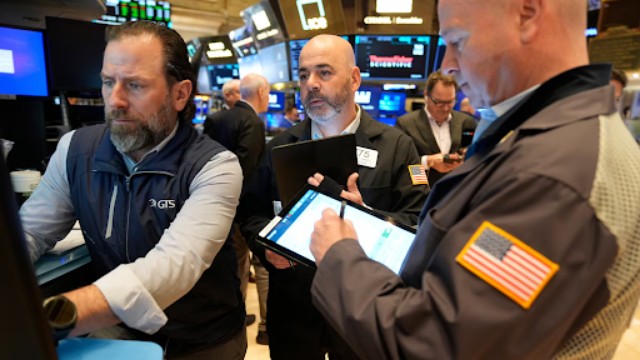
Traders are seen at their desks on the floor of the New York Stock Exchange in New York on Tuesday, April 8, 2025. (AP Photo/Seth Wenig)
In a day filled with wild market swings, U.S. stocks plunged Tuesday after a powerful morning rally fizzled out, leaving investors rattled. The early optimism quickly turned into concern as traders continued to grapple with the unknowns surrounding President Donald Trump’s escalating trade war, especially his looming tariffs on imports from China.
At the start of trading, it seemed like a banner day was unfolding. The S&P 500 surged by as much as 4.1%, on track for one of its best days in recent memory. But that enthusiasm didn’t last. The index reversed direction sharply, eventually closing down 1.6%. The Dow Jones Industrial Average, which had gained 1,460 points at its peak, ended the day with a loss of 320 points. The tech-heavy Nasdaq dropped even more, falling 2.1%.
These drastic shifts weren’t limited to the U.S. Globally, markets also saw an early lift—Tokyo's index jumped 6%, Paris climbed 2.5%, and Shanghai edged up 1.6%. Still, despite the bright start, experts warned that volatility would likely persist, not just over days but even within hours.
Much of the tension centres on Trump’s unpredictable trade decisions. With new tariffs on Chinese goods set to take effect after midnight, many fear the cost of everyday items will rise and economic growth will slow. If these tariffs stick around for long, analysts warn, a recession could follow. But there’s still hope that negotiations might soften the blow.
Earlier in the day, Trump posted on Truth Social that talks with South Korea had made progress, suggesting a “great DEAL” might be in reach. He also noted that other nations are eager to strike trade agreements with the U.S. That glimmer of optimism was enough to spark the morning rally.
Meanwhile, Japan appeared ready to join trade talks, with Prime Minister Shigeru Ishiba appointing a top negotiator following a discussion with Trump. But hopes for peace in trade didn’t last long.
Wells Fargo strategist Sameer Samana urged investors to remain cautious, pointing out that global tensions are still escalating. China, for example, vowed to fight back after Trump warned of even higher tariffs.
White House press secretary Karoline Leavitt confirmed those warnings, stating that after midnight, tariffs on Chinese imports would soar to 104%. Trump reportedly won’t allow exemptions, a stance confirmed by U.S. Trade Representative Jamieson Greer.
Greer also testified before the Senate, noting that around 50 countries have reached out in hopes of striking trade deals that would reduce the U.S. trade deficit. Trump’s push, he said, aims to reshape global trade in America’s favour—even if it disrupts longstanding economic patterns.
Companies with complex supply chains, especially those tied to China, were among the hardest hit. Ralph Lauren’s stock dropped 5.6%, reflecting its 15% sourcing from China. Best Buy, even more reliant on Chinese-made goods through vendors, saw its shares fall 8.3%.
On the other hand, health insurers had a good day. After Medicare Advantage payment increases were announced, Humana’s shares jumped 10.7% and United Health climbed 5.4%.
By the closing bell, the S&P 500 lost 79.48 points to close at 4,982.77. The Dow slipped to 37,645.59, and the Nasdaq ended the day at 15,267.91 after shedding 335.35 points.
Bond markets also reacted. The yield on the 10-year Treasury note rose to 4.27%, up from 4.15% on Monday and 4.01% on Friday, signalling growing expectations for inflation and economic growth.
While Wall Street remains hopeful for progress on trade, the road ahead looks bumpy. Until there's clarity from the White House, expect the markets to keep bouncing.















